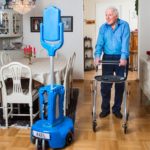Your Retirement May Include a Robot Helper
As industrial robots become more capable, they could start helping out around the home.

Youngsters aren’t the only ones who get the latest high-tech gadgets. Sometime in the next decade or two, homebound retirees could be early adopters of an important new technology: the home-help robot.
As robots become safer, smarter, and more capable, robotics companies are eyeing elder care as a huge potential market. A rapidly expanding elderly population could also necessitate other new forms of home-assistance technology.
“God help us if we don’t figure it out,” Colin Angle, CEO of Roomba maker iRobot, said during RoboBusiness, a robotics conference held in Boston this month. “Because over the next 20 years the ratio of people over the age of 65 to the number of people under 65 is going to change rather dramatically.”
Estimates from the United Nations suggest the population over 65 worldwide will increase 181 percent between 2010 and 2050, compared to a 33 percent increase in people aged 15 to 65. That shift will create a large incentive to automate at least some assistive work.

A European project has equipped some elderly people’s homes with technology including telepresence robots
Some robots are already lending a mechanical hand. As part of an E.U.-funded research project, senior citizens in Italy, Spain, and Sweden have had their homes equipped with sensors to track their activity and health. Mobile telepresence robots—a wheeled videoconferencing system that can be piloted remotely—let relatives and doctors check in with them. Some nursing homes in Japan, Europe, and the U.S. give lonely residents a robotic seal called Paro as a companion. It responds to petting by cooing and purring and will cry if dropped or ignored.
s such machines become more sophisticated, robot helpers could assist people with everyday household chores and with dressing and bathing. Eventually robots may interact far more intelligently as entertainment or company.
iRobot doesn’t make anything that sophisticated, but Angle says the company is well positioned to develop such technology because it has thought so long about how to make robots work in the home. The company makes several telepresence robots, various robots for the military, and a range of home-cleaning robots, including the Roomba.
The Roomba is the most successful elder-care robot ever created"
Angle said, “it helps people who can’t push a vacuum maintain a sense of control over the environment they live in.”
Robots seem to be converging on elder care from several directions. Robotic assistance systems that fit over arms or legs are emerging as a way to help those who have a hard time walking or picking up objects stay independent. Researchers in Denmark have adapted a robotic factory arm made by Universal Robots to see if it can be used to help people shower.
Some emerging robotic products can help with simple jobs. For instance, Yujin Robot, a Korean company, has a low-cost system that navigates around a hospital or elder-care facility and delivers meals. Other companies at RoboBusiness demonstrated sophisticated and low-cost robotic manipulators. While these robot hands are being developed primarily as a way to automate industrial tasks, they could also be put to use folding laundry, collecting dishes, or straightening neckties.
Having machines perform such tasks—and not only for the elderly—is “closer than people realize,” says Rich Mahoney, director of robotics at the research company SRI. “There are tons of opportunities: robots that can do dishes and can clean, and all the things people want in terms of folding laundry and cleaning bathrooms,” he says.
Still, there’s a long way to go to make robots user-friendly, especially for a set of users not known for being tech-savvy. Angle pointed to the latest version of one of the military robots iRobot makes, essentially a large metal claw on wheels. “Would you feel comfortable having this robot dress your mom?” he asked. “Probably not.”